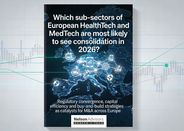Digital Health Intelligence Market Analysis: Medical Device Cyber Security
- Lloyd Price
- Apr 27, 2024
- 6 min read

In a new series of Digital Health Intelligence Market Analysis, HealthTech Founder and M&A Advisor Lloyd Price examines a range of high potential market segments in the UK, including:
1. Virtual Care – From Hype to Reality
2. Patient Engagement Platforms – Rebuilding Trust in the NHS
3. Population Health – from Reactive Care to Proactive Prevention
4. Digital Therapeutics – looking forward to a year of growth
5. AI in Clinical Imaging – shaping the future of healthcare
6. Electronic Bed and Capacity Management Systems - crucial support for an NHS under pressure
7. Shared Care Records - a time of transition and expansion
8. Medical Device Cyber Security
Digital Health Intelligence Market Analysis - from identifying high value market segments to sales prospecting, Intelligence supports multiple teams with essential insights and reliable, granular-level data on NHS acute and mental health trusts, central bodies, STPs, ICSs and commissioning organisations.
Digital Health Intelligence is the 'Trusted Authority on Digital Health' in the UK - Subscribe Today! https://lnkd.in/e8ZVAdGT
1. DHI Market Analysis: Virtual Care – From Hype to Reality
In the first of a new series of analyses for Digital Health Intelligence subscribers, Lloyd Price examines the virtual care market.
Virtual care holds potential in healthcare delivery, blending innovation with tradition. However, beneath the surface lies complexity. NHS frontline staff, navigating post-COVID challenges, perceive virtual wards as additional digital tasks, amid staffing shortages and mounting hurdles.
2. DHI Market Analysis: Patient Engagement Platforms – Rebuilding Trust in the NHS
Patient engagement platforms are gaining momentum with NHS England’s backing. They’re central to the ‘Digital Front Door’ strategy, focusing on patient-facing services, enhancing secondary care, and reducing the strain on frontline services. These platforms address the pandemic-induced disconnect between patients and the NHS.
3. DHI Market Analysis: Population Health – from Reactive Care to Proactive Prevention
This report offers a comprehensive overview of the evolving landscape of population health management and the challenges and opportunities it presents to the NHS. It underscores the importance of proactive approaches to healthcare and the critical role that data and technology will play in shaping the future of healthcare in the UK.
4. DHI Market Analysis: Digital Therapeutics – looking forward to a year of growth
The Digital Health Intelligence (DHI) Market Analysis on Digital Therapeutics highlights the transformative impact of evidence-based interventions delivered through devices. In the past year, there has been a significant surge in the adoption of digital therapeutics, especially within the NHS, addressing various healthcare challenges.
5. AI in Clinical Imaging – shaping the future of healthcare
Our analysis of AI in Clinical Imaging reveals a significant NHS commitment to leveraging artificial intelligence for improved patient care. The NHS AI Lab, regional networks, and funding initiatives showcase strategic investments in cutting-edge technology.
Real-world examples from leading healthcare providers highlight AI’s tangible benefits, while acknowledging challenges such as data quality and ethical considerations.
Looking ahead, the report anticipates AI’s continued impact on disease detection and patient outcomes, underscoring its promising role in reshaping clinical imaging practices.
6. Electronic Bed and Capacity Management Systems - crucial support for an NHS under pressure
The Digital Health Intelligence (DHI) Market Analysis delves into the realm of Electronic Bed and Capacity Management Systems (eBCMS), shedding light on their key role in supporting an NHS under pressure.
Faced with challenges such as strained resources, the impact of the Covid-19 pandemic, and prolonged waiting times in A&E, the NHS has increasingly embraced eBCMS to enhance patient flow, reduce waiting times, and optimise bed utilisation.
This report explores the trajectory of eBCMS adoption, available funding, notable examples, leading suppliers, and the future landscape
7. Shared Care Records - a time of transition and expansion
This Market Analysis of Shared Care Records (SCRs) reveals a dynamic landscape within the NHS marked by both progress and persistent challenges. While many regions have effectively implemented SCRs, barriers such as interoperability and a focus on planned care hinder widespread adoption.
Funding for the Connecting Care Records (ConCR) programme, vital for sustainability beyond 2025, remains uncertain, although avenues for support from agencies like Innovate UK exist.
Highlighted examples of successful SCR implementations include the Yorkshire and Humber Care Record, Great North Care Record, and One London initiative. Leading suppliers like Graphnet, Oracle Health, Orion Health, and InterSystems offer sophisticated solutions, enhancing data sharing and patient care coordination.
8. Medical Device Cyber Security
The current status of medical device cyber security (MDCS) across NHS England presents a mixed picture. On the one hand NHS England has issued guidance to NHS trusts for the procurement, deployment, and management of connected medical devices, as well as training for secure network segmentation and compliance with the Data Security and Protection Toolkit (DSPT).
However, on the other hand, legacy medical devices are a real day-to-day issue. Many NHS trusts rely on older medical devices that do not have robust cyber security features or receive ongoing security updates. In addition, most NHS trusts lack experienced staff and the resources to design and deliver an enhanced MDCS programme.
For example, the rigorous testing of security updates for medical devices is crucial to avoid disrupting critical functionality; delays in patching vulnerabilities leave devices exposed for longer periods and more vulnerable to cyber threats.
Overall, NHS trusts in England are moving in the right direction with MDCS, but challenges remain. Continued efforts are needed to streamline the patching process, address legacy devices, and ensure all hospitals and trusts have the resources to implement effective cybersecurity measures.
Future of medical device cyber security
Software Bill of Materials (SBOMs) will play an important role in the future of medical device cyber security. SBOMs are a list of all the software components that make up a software product; they can be used to improve the security, quality, and efficiency of software development and maintenance.
Every day, thousands more connected devices and medical devices are added to NHS networks, continually increasing the risk landscape for providers. In the future it will be critical to understand the software components of all devices in order to mitigate the risks of a cyber attack (niche or widespread) associated with one specific software component.
Virtual wards, which provide remote monitoring and care for patients outside of traditional hospital settings, present unique cyber security risks. While they offer benefits in terms of patient care and resource optimisation, in the future hospitals and NHS trusts will need to address cyber security risks associated with virtual wards such as network security, device security, insider threats and regulatory compliance.
One year from now
Looking ahead 12 months, NHS trusts and ICBs will focus on providing more training for their staff, increasing best practices and knowledge sharing at a local level, investing in their workforces and updating their risk mitigation plans in anticipation of potential attacks on both connected and medical devices.
Cathy O’Keefe, deputy director of security, Cyber Operations at NHSE, reinforced these points recently at Digital Health Rewired 2024, saying: “We need to invest in people and invest in training. We should never underestimate the human element of cyber.”
From a supplier perspective, partnerships are likely to develop further in 2024 and into 2025, both product and commercial partnerships. NHS trusts and ICBs are increasingly viewing medical device cyber security in the same way as EPRs – they need system integration, data sharing and visualisation, rules mapped to pathways, alerts and notifications to individuals, teams, and departments.
For example, Cylera and eQuip partnered recently to “bring interconnected hospital and healthcare environments a fully integrated asset management and centralised cybersecurity system for continuous visibility with granular device data, accurate risk profiling, comprehensive inventory, and extensive threat mitigation”.
Overall, medical device cyber security will continue to be a priority for NHS trusts and hospitals, with both suppliers and NHS Digital supporting them with specialist knowledge, frameworks and solutions.
Digital Health Intelligence
Digital Health Intelligence is the 'Trusted Authority on Health IT, HealthTech and Digital Health' in the UK - Subscribe Today! https://lnkd.in/e8ZVAdGT

Digital Health Intelligence:
Digital Health provides independent business, policy and technology news, research and events focused on developments in health IT in the NHS and UK health. Our coverage is focused, original and authoritative. Over 20,000 readers subscribe to Digital Health’s newsletters.
Digital Health News provides daily news and analysis on the UK health IT sector, spanning NHS IT infrastructure, enterprise and clinical systems such as EPR (electronic patient records) to emerging and disruptive technologies, including AI, apps and wearables.
Digital Health Intelligence is our market intelligence data business providing the most detailed database available on the current systems, technology and infrastructure installed at every NHS trust in the UK, together with future purchasing intentions and market trends analysis. The subscription-based service enables suppliers to understand and target market opportunities.
Digital Health Intelligence is the 'Trusted Authority on Health IT, HealthTech and Digital Health' in the UK - Subscribe Today! https://lnkd.in/e8ZVAdGT



















































Comments